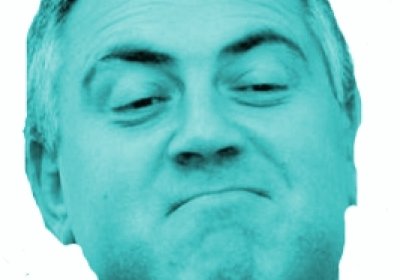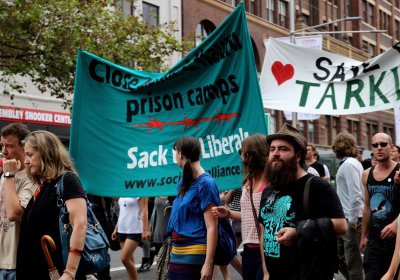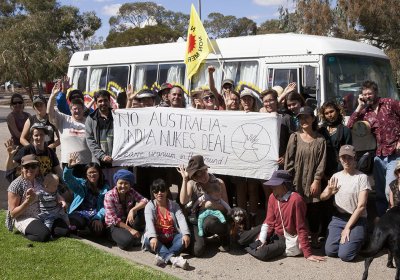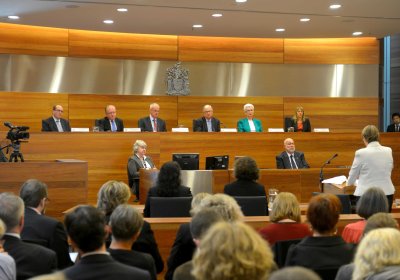If modern industrial capitalism were a person, he or she would be on suicide watch. The system that has brought us quantum physics and reality television, modern medicine and the columns of Andrew Bolt is set on a course which, by all the best reckoning, points directly to its doing itself in.
If capitalism goes on — everything goes. Climate, coastlines, most living species, food supplies, the great bulk of humanity. And certainly, the preconditions for advanced civilisation, perhaps forever.
1006
“I wish I could leave Greece. I can’t go on living here. I work very long hours and live more frugally than ever, but I still can’t pay the bills, the income tax or the other taxes like the property poll tax.
“My tax debt keeps building up. I’ll end up losing my home. They are stealing our homes and they are not communists. And people are getting sadder and madder every day. I can’t go on like this.”
“Nothing is free — someone always pays,” federal treasurer Joe Hockey said in his latest softening-up, pre-budget speech on April 24.
Yeah, tell us about it.
A meeting of the Cartagena Dialogue for Progressive Action took place in the Marshall Islands on April 1. The body is composed of 30 countries working towards a legally binding United Nations climate change convention before of an international summit next year.
Delegates had a chance to witness first-hand the effects of climate change in the host country, a small atoll nation in the Pacific Ocean, where no land rises more than two metres above sea level.
The election of the Tony Abbott government in September last year signalled an intensification of attacks on workers' rights, the public sector, jobs and what remains of the social wage.
As the global economic situation deteriorates, the ruling class is intent on imposing widespread privatisation, outsourcing of public services, job cuts and wage cuts.
The Richmond Valley Council has asked a large protest camp in Bentley, near Lismore in NSW, to dismantle. The camp was set up to protect the local area from gas drilling by Metgasco. Several hundred people in the camp have maintained an ongoing blockade to prevent access to the site where test drilling is due to begin.
Organisers of the camp, which is set up on private land, have refused the request.
One of the greatest novelists and writers of the 20th century has died. Colombian author Gabriel Garcia Marquez passed away on April 17 in Mexico at the age of 87.
Commemorating the author, US-based progressive TV and radio show Democracy Now! said on April 18: “It has been reported that only the Bible has sold more copies in the Spanish language than the works of Garcia Marquez, who was affectionately known at 'Gabo' throughout Latin America.”
"Money speaks” is the message we should be taking from the last few weeks of state politics in NSW.
Inappropriate and undeclared financial dealings and interests are being found at every level of Australian politics. The parliamentary parties are riddled with factions, controlled by powerbrokers who promote the careers of their own base of loyal supporters. This undemocratic concentration of power leaves the parties unable to resist corruption.
As one corrupt politician is dispatched there are always plenty more to take their place.
Forty people travelled over 6000 kilometres as part of an anti-nuclear educational trip from Melbourne to Tennant Creek in the Northern Territory and back from April 12 to 27.
The annual “Rad Tour" weaved its way through Victoria, South Australia and the Northern Territory to educate people about the dangers of the nuclear industry.
The workers at a Super A-Mart warehousing and distribution centre in Somerton, Victoria, have scored a victory over company management nearly six weeks after they were locked out of their workplace.
The workers have won a 10% wage rise over the next three years, improved redundancy conditions, permanency conversions after six months, an Occupational Health and Safety committee on site, as well as a $750 sign-on bonus.
Their victory was in partly due to the overwhelming success of the “Low Wage Bus Tour”, which left Melbourne on April 9 with the slogan “Raise the Wage”.
The Tony Abbott government, in line with its ruthless drive to privatise all remaining public sector assets, last month announced a plan to sell off Medibank Private during the 2014-15 financial year. Following the secret recommendations of the government's big-business-controlled Commission of Audit, the federal budget in May is likely to include further attacks on Medicare — undermining its character as a national, universal health-care system.
When the Royal Commission into Trade Union Governance and Corruption first sat on April 9 it did little more than give general guidance about the direction of the inquiry.
This was largely provided by counsel assisting, Jeremy Stoljar SC. The learned counsel was eager to ensure all concerned that there were no preconceptions with the inquiry. But he did make the helpful suggestion that the legal obligations of union officials should be “even more onerous” than those of company directors.
- Previous page
- Page 2
- Next page











